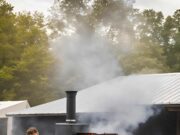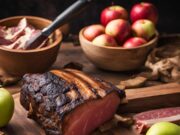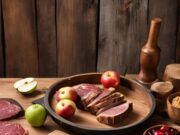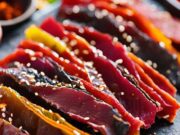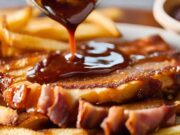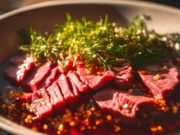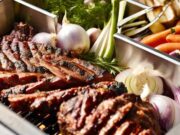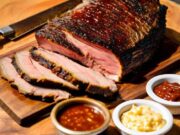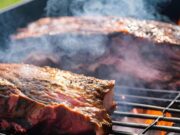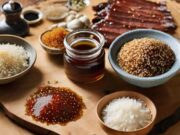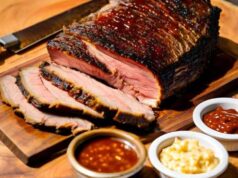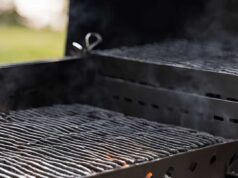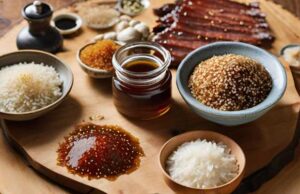- Key Takeaways:
- The Ultimate Guide to Enhancing BBQ Flavor: Tips and Techniques
- Understanding BBQ Flavor Enhancement
- Essential Techniques for Flavor Enhancement
- Smoking and Grilling Techniques
- Mastering BBQ Sauces
- Pairing Flavors
- Common Mistakes to Avoid
- FAQs on BBQ Flavor Enhancement
- Frequently Asked Questions
Barbecue transcends mere cooking; it is an art form that delights the palate and fosters connections among people.
This guide will help you elevate your BBQ skills by enhancing flavor through essential techniques and tips. From selecting the right cuts of meat and mastering marinades to experimenting with various smoking woods and crafting your own BBQ sauces, this guide covers all the fundamentals.
Whether you are a newcomer or a seasoned pitmaster, you will discover how to create unforgettable flavor profiles while avoiding common pitfalls, ensuring a truly mouthwatering experience.
Are you prepared to enjoy the best barbecue of your life? Let’s begin!
Key Takeaways:
- Choose the right cuts of meat to enhance flavor. Look for marbling and consider the type of meat for its natural flavor profile.
- Experiment with different smoking woods and grilling methods to add depth and complexity to your BBQ flavor. Don’t be afraid to try new combinations and techniques.
- Pairing flavors is key in creating a well-balanced BBQ dish. Consider the type of meat and its natural flavor, and experiment with complementary flavors to elevate your BBQ experience.
The Ultimate Guide to Enhancing BBQ Flavor: Tips and Techniques
The Ultimate Guide to Enhancing BBQ Flavor: Tips and Techniques serves as your comprehensive resource for perfecting the art of barbecue. This culinary tradition extends beyond mere cooking methods, encompassing rich cultural practices from regions such as Kansas City, Carolina, and Memphis.
By mastering various cooking techniques, including grilling and smoking, and by utilizing the right spices and herbs, you can craft exceptional homemade barbecue that surpasses even the most popular bottled sauces. This will elevate your BBQ ribs and other party foods with sweet, tangy, and smoky flavors that truly captivate the palate.
Understanding BBQ Flavor Enhancement
Understanding BBQ flavor enhancement requires recognizing how different cooking techniques, such as marinating and selecting the appropriate spices and herbs, can significantly impact the flavor profiles of your dishes.
By mastering heat management and developing your own rubs, you can create a memorable barbecue sauce that perfectly complements your grilled meats.
The Importance of Flavor in BBQ
The importance of flavor in BBQ cannot be overstated; it is the fundamental aspect that distinguishes exceptional barbecue sauce from the ordinary. Sweet and tangy notes, combined with smoky flavors, represent the gold standard that keeps barbecue enthusiasts returning for more.
Understanding how to balance these flavor profiles is crucial for anyone seeking to elevate their BBQ skills. Different cooking techniques, such as slow smoking, grilling, or roasting, can dramatically influence the final taste, enhancing the inherent sweetness of caramelized sugars while introducing depth through rich, smoky undertones.
The interplay of spices and marinades can further enhance the tanginess of vinegar-based sauces, creating a harmonious blend that tantalizes the palate. It is this intricate dance of flavors that not only defines great BBQ but also makes it an unforgettable experience, inviting diners to savor each bite and explore the layers of taste.
Key Elements That Affect BBQ Flavor
Key elements that affect BBQ flavor include your choice of barbecue sauce, the cooking techniques employed, and the combination of spices and herbs used to season the meats. Each of these factors contributes significantly to the overall flavor profiles and the enjoyment of the dish.
Each component plays a critical role in creating a memorable BBQ experience. For example, barbecue sauce not only adds layers of sweetness, acidity, or heat but also helps lock in moisture, which is essential for achieving tender bites. Meanwhile, whether you opt for low and slow smoking or high-temperature grilling, your cooking methods impart distinct textures and smoky nuances that enhance the meat’s inherent flavor.
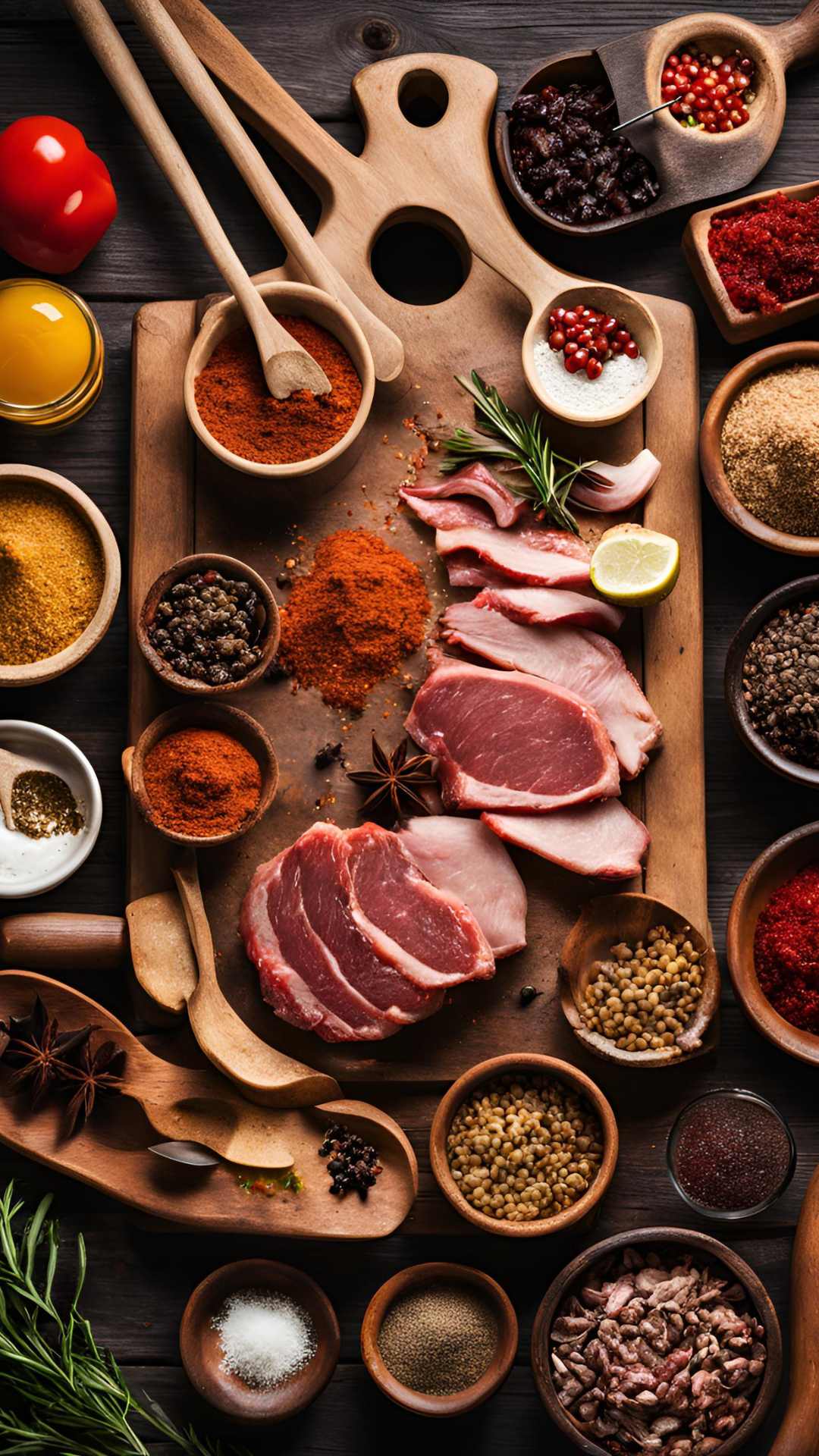
Additionally, spices and herbs elevate the dish by adding complexity; their unique blends can transform a simple rub into a signature flavor profile that intrigues the palate and encourages exploration.
Essential Techniques for Flavor Enhancement
Utilizing essential techniques for flavor enhancement is crucial for achieving an unforgettable BBQ experience. This involves employing the right combination of cooking techniques, effective marinating practices, and creating DIY rubs using spices and herbs that elevate the quality of your meat.
Choosing the Right Cuts of Meat
Choosing the right cuts of meat is essential for achieving BBQ success. Different types of meat, such as BBQ ribs, offer unique flavor profiles and textures that necessitate specific cooking techniques and marinating practices to fully unlock their potential.
For example, brisket is well-known for its rich, beefy flavor and tenderness when slow-cooked. It often benefits from a generous rub of spices and a lengthy smoking process to effectively break down its tough fibers.
On the other hand, pork shoulder, commonly referred to as butt, is ideal for pulled pork; its marbling facilitates self-basting, ensuring that it remains juicy and flavorful throughout the cooking process.
Chicken, particularly thighs, absorbs marinades exceptionally well, resulting in a savory and succulent dish when grilled or smoked. Each cut brings its own unique characteristics to the barbecue experience, making the selection of meat a crucial factor in achieving the perfect smoky flavor and texture.
The Art of Marinating
The art of marinating involves utilizing a balanced blend of spices and herbs to create a sweet and spicy mixture that not only tenderizes the meat but also infuses it with rich flavor, enhancing your overall BBQ experience.
This process typically begins with a base of acidic ingredients such as vinegar, citrus juice, or yogurt, which serve to break down tough proteins and make the meat softer and more palatable. Incorporating ingredients like olive oil aids in melding flavors and preventing dryness during cooking.
Essential spices such as paprika, garlic powder, and cumin provide depth, while herbs like rosemary and thyme introduce an aromatic quality.
Adding sweet elements, such as honey or brown sugar, can create a delightful caramelization when grilled. Each component plays a critical role in transforming the ordinary into something extraordinary, ensuring that your BBQ is truly memorable.
Creating Flavorful Rubs and Marinades
Creating flavorful DIY rubs and marinades is an essential skill for any BBQ enthusiast. This allows you to personalize your flavor profiles by experimenting with various spices and herbs to achieve that perfect sweet and tangy finish.
These custom blends not only enhance the taste but also help to bring out the natural juices of your meats, providing a mouthwatering experience that your guests will undoubtedly rave about.
With countless combinations available, you can elevate your grilling game by starting with basic ratios of salt, sugar, and spices. A great starting point is a balanced blend of brown sugar and smoked paprika for a sweet and smoky flavor. Incorporating garlic powder and black pepper can add depth to your profile.
For those looking to introduce some heat, adding cayenne or chili powder can provide a delightful kick. Remember, experimentation is key, so do not hesitate to adjust quantities and try new ingredients to uncover unique flavors.
Smoking and Grilling Techniques
Mastering smoking and grilling techniques is essential for any BBQ enthusiast. These methods not only impact heat management but also significantly influence the flavor profiles of each dish.
This knowledge allows you to explore a variety of barbecue methods, from traditional smoking to high-heat grilling.
Understanding Different Smoking Woods
Understanding different smoking woods is essential for mastering smoking techniques, as each type imparts unique flavor profiles that influence heat management and align with various culinary traditions in BBQ.
For instance, hickory is renowned for its strong, bacon-like flavor, making it a staple for those who aim to enhance their meats. In contrast, applewood provides a milder, fruity sweetness that pairs beautifully with poultry and pork. Mesquite, often used in Texas-style BBQ, offers an intense and earthy aroma that can significantly enhance beef dishes.
By experimenting with these diverse wood types, you can discover how they complement specific ingredients, ultimately transforming an ordinary BBQ experience into a remarkable culinary adventure.
Grilling Methods for Maximum Flavor
Grilling methods for maximum flavor emphasize the importance of utilizing various techniques to manage heat effectively, thereby enhancing the flavor profiles of meats, making them perfect for party food and casual gatherings.
Different techniques, such as direct and indirect grilling, smoking, and searing, can significantly influence the overall taste and texture of your grilled dishes. Direct grilling, which involves cooking food over a direct flame, creates a desirable char and caramelization that many find appealing. On the other hand, indirect grilling offers a gentler heat, tenderizing larger cuts of meat like ribs or briskets while infusing them with rich smoky flavors.
By mastering the art of marinating and applying dry rubs, you can elevate your grilled creations even further, adding layers of complexity that will undoubtedly impress your guests at any barbecue occasion.
Mastering BBQ Sauces
Mastering BBQ sauces is a fundamental aspect of creating delicious homemade barbecue. The right sauce not only enhances flavor profiles but also balances sweet and spicy elements, distinguishing it from standard bottled sauces.
Types of BBQ Sauces and Their Flavor Profiles
Types of BBQ sauces vary widely, offering a range of flavor profiles from sweet and tangy to smoky, each tailored to different cooking styles and regional preferences.
For example, Kansas City BBQ sauce is renowned for its thick, molasses-like sweetness combined with a hint of acidity, making it an excellent complement for brisket and ribs, enhancing the meat’s natural richness. In contrast, South Carolina’s mustard-based sauce features sharp and zesty notes that pair wonderfully with pork, cutting through the fat and elevating the overall experience.
On the other hand, a vinegar-based sauce commonly found in Eastern North Carolina provides a lighter, tangy option that complements smoked whole hog or pulled pork beautifully, highlighting how regional traditions shape these flavorful condiments. Each variation offers a unique twist, enabling BBQ enthusiasts to experiment and discover the ideal pairings for their favorite cuts.
How to Make Your Own BBQ Sauce
Creating your own BBQ sauce at home allows for a high degree of customization in flavor. You can combine various spices and herbs to achieve a delicious blend that suits your unique preferences, whether you prefer a sweet and spicy profile or a smoky and tangy one.
This hands-on approach not only guarantees that your sauce is free from preservatives and fillers but also gives you the flexibility to adjust ingredients to perfectly complement your choice of meats or vegetables. To begin, consider using a base of tomato paste or ketchup, then explore flavor enhancers such as apple cider vinegar for acidity or brown sugar for sweetness.
Incorporating herbs like paprika, garlic powder, and onion powder can significantly elevate the taste profile, adding depth and richness. As you experiment with different ingredients, remember to maintain a balance between sweet and savory; a splash of Worcestershire sauce or a hint of mustard can introduce an exciting twist.
It is important to taste and adjust as you go along to create the ideal sauce that will enhance any barbecue feast.
Pairing Flavors
Pairing flavors correctly is crucial in BBQ, as the right combinations can significantly enhance dishes such as BBQ ribs and other party foods. It is equally important to consider vegetarian and vegan flavor pairings to accommodate diverse palates.
By focusing on these optimal combinations, you can create a more enjoyable dining experience for all guests.
Ideal Flavor Combinations for Different Meats
Achieving ideal flavor combinations for various meats, such as BBQ ribs, requires the careful application of smoking and grilling techniques, which significantly enhance the overall taste experience.
By understanding the key traits of each type of meat, you can select complementary flavors that elevate your dishes. For instance, rich cuts like beef brisket pair exceptionally well with sweet and spicy rubs, which accentuate their smokiness. On the other hand, lighter meats like chicken benefit from citrus-based marinades that brighten the flavors and keep the meat juicy.
Employing techniques such as marinating, brining, or using dry rubs creates the perfect environment for excellent flavor penetration. Regarding seafood, a simple herb and garlic marinade before grilling can amplify the natural flavors without overpowering them, showcasing the versatility of cooking methods in achieving delicious results.
Vegetarian and Vegan Flavor Pairings
Vegetarian and vegan flavor pairings are becoming increasingly popular in BBQ culture. Innovative flavor combinations, including sweet and spicy profiles, create satisfying options for party food using vegetables and plant-based proteins.
By experimenting with ingredients such as smoky paprika, tangy citrus, and fresh herbs, you can elevate your BBQ offerings while ensuring that everyone at the table enjoys a delightful array of flavors. Incorporating elements like grilled peaches drizzled with balsamic glaze or spicy marinated tofu will not only add richness but also surprise the palate.
Utilizing robust marinades made from miso, tamari, or even a splash of maple syrup can infuse deep, complex flavors into grilled vegetables, fostering an inclusive and mouthwatering experience that showcases the diverse potential of plant-based cuisine.
Common Mistakes to Avoid
Common mistakes to avoid in BBQ include over-smoking or over-seasoning meats, as both can significantly compromise the flavor. This highlights the importance of effective heat management and employing techniques that ensure the meat remains juicy.
By paying attention to these details, you can enhance the overall quality of your BBQ experience.
Avoiding Over-Smoking or Over-Seasoning
Avoiding over-smoking or over-seasoning is crucial for maintaining balanced flavor profiles in BBQ. Too much smoke can overpower the natural flavors of the meat, while excessive seasoning can mask its true taste.
Striking the right balance allows the unique characteristics of each cut to shine through, enhancing the overall dining experience. You should invest in high-quality wood chips to ensure a subtle infusion of flavor rather than a harsh, acrid taste that can result from over-smoking.
Similarly, when it comes to seasoning, it is advisable to start with a light hand and adjust according to your personal preference, as this will help highlight the meat’s inherent qualities. Additionally, keeping a close watch on cooking times and temperatures can significantly impact your ability to achieve that perfect BBQ balance without overwhelming the palate.
Tips for Keeping Meat Juicy
To keep meat juicy during a BBQ, it is important to employ effective cooking techniques, master heat management, and utilize marinating to ensure that the final dish remains succulent and flavorful.
For optimal results, focus on several key practices. First, marinating the meat enhances flavor while creating a protective barrier that helps retain moisture during the cooking process. Maintaining the right cooking temperature is essential; a consistent low and slow approach often results in tender, juicy cuts. Utilizing indirect heat is also an excellent choice, as this method allows for even cooking without drying out the meat.
Additionally, consider covering the grill to trap steam, which further helps lock in moisture and ensures that the final product is both delightful and juicy.
Recap of Key Flavor Enhancement Techniques
A recap of key BBQ flavor enhancement techniques underscores the importance of DIY rubs, marinating, and mastering cooking methods to elevate your overall barbecue experience.
These methods not only deepen the flavor profile of the meats but also allow for personalization, making each barbecue session unique. For instance, creating your own dry rubs using a blend of spices and herbs can introduce entirely new taste dimensions, while marinating helps tenderize the meat and infuse it with moisture.
Understanding various cooking techniques, whether smoking, grilling, or using indirect heat, plays a significant role in the final outcome, ensuring that flavors are locked in and textures are perfected. By applying these approaches, you can transform your culinary endeavors into mouthwatering feasts that will impress every guest.
Encouraging Experimentation in BBQ
Encouraging experimentation in BBQ allows you to explore diverse flavors and refine your techniques, ultimately honoring the culinary tradition while paving the way for innovative practices in flavor enhancement.
This creative approach to grilling opens up a world of possibilities, enabling you to tailor your culinary creations to your personal taste. From trying unique marinades and rubs to incorporating unexpected ingredients like fruit woods or exotic spices, the journey of experimentation can lead to truly signature dishes.
Each trial not only builds your confidence in grilling abilities but also inspires a deeper connection to the craft, demonstrating that BBQ is not merely about following recipes but about crafting an identity through taste.
As a pit master, you can find joy in the process of experimentation, inviting friends and family to join in the adventure of discovering your distinct flavor profiles.
FAQs on BBQ Flavor Enhancement
FAQs on BBQ flavor enhancement address the common questions that enthusiasts have about techniques, ingredients, and best practices for achieving exceptional flavors in their dishes.
Understanding these aspects can significantly enhance the quality of your BBQ and elevate your culinary experience.
Common Questions About BBQ Techniques
Common questions about BBQ techniques typically focus on methods for enhancing flavor, such as the best smoking techniques and how to apply them effectively for optimal results.
Many enthusiasts seek to comprehend the differences between hot and cold smoking, as well as the variety of wood chips available to impart distinct flavors to their meats. Inquiries about marinating versus dry rubbing frequently arise, with many wondering which method better enhances texture and taste.
Additionally, some may request guidance on maintaining consistent temperatures during cooking or how long their meats should rest before slicing. Understanding these elements can significantly elevate your BBQ skills, transforming a casual cookout into a savory feast that will impress your guests.
Expert Tips for Better BBQ Flavor
Expert tips for enhancing BBQ flavor emphasize the importance of refining your grilling techniques, optimizing heat management, and mastering the balance of flavors to create exceptional barbecue experiences.
To elevate the taste of your grilled dishes, it is essential to embrace various cooking methods, such as using direct versus indirect heat, depending on the type of meat and the desired outcome. Seasoning is also crucial; marinating proteins in flavorful blends for several hours—or even overnight—can significantly improve tenderness and taste.
Additionally, incorporating wood chips or herbs during the smoking process adds depth to the overall flavor profile. By paying close attention to these specific techniques, you can transform your grilling sessions into gourmet gatherings that leave your guests raving about the unforgettable taste of your barbecue.
Frequently Asked Questions
What is the best type of wood to use for BBQ flavor?
The best type of wood to use for BBQ flavor depends on the type of meat you are cooking. For beef, hickory and mesquite are popular choices, while fruit woods like apple and cherry work well with pork. Experiment with different types of wood to find your favorite flavor combination.
How can I enhance the flavor of my BBQ sauce?
There are several ways to enhance the flavor of your BBQ sauce. You can add a splash of apple cider vinegar for a tangy kick, a spoonful of honey for sweetness, or a pinch of cayenne pepper for some heat. You can also try using different types of BBQ sauce, such as Kansas City-style or Carolina-style, to add variety to your BBQ dishes.
What is the importance of marinating meat before BBQing?
Marinating meat before BBQing is important because it adds flavor and helps tenderize the meat. The marinade’s acidic ingredients, like vinegar or citrus juice, break down the meat’s proteins and make it more tender. It also allows the meat to absorb the flavors of the marinade, resulting in a more flavorful and juicy BBQ dish.
Should I use a dry rub or a marinade for BBQ meat?
It depends on personal preference and the type of meat you are BBQing. Dry rubs are great for adding a strong flavor to the exterior of the meat, while marinades penetrate the meat and add flavor throughout. If you want a bold flavor, go for a dry rub, but if you want a more subtle flavor, a marinade may be the way to go.
How can I control the smoke flavor in my BBQ dishes?
To control the smoke flavor in your BBQ dishes, you can adjust the type and amount of wood you use, as well as controlling the temperature of your grill or smoker. For a lighter smoke flavor, use less wood and make sure the temperature is not too high. You can also try using different types of wood to achieve a specific flavor profile.
What is the best way to cook ribs for ultimate BBQ flavor?
The best way to cook ribs for ultimate BBQ flavor is to start off with a dry rub, then slow cook them over low heat for several hours. This allows the flavors to develop and the meat to become tender. You can also baste the ribs with BBQ sauce during the last hour of cooking for an extra layer of flavor.


